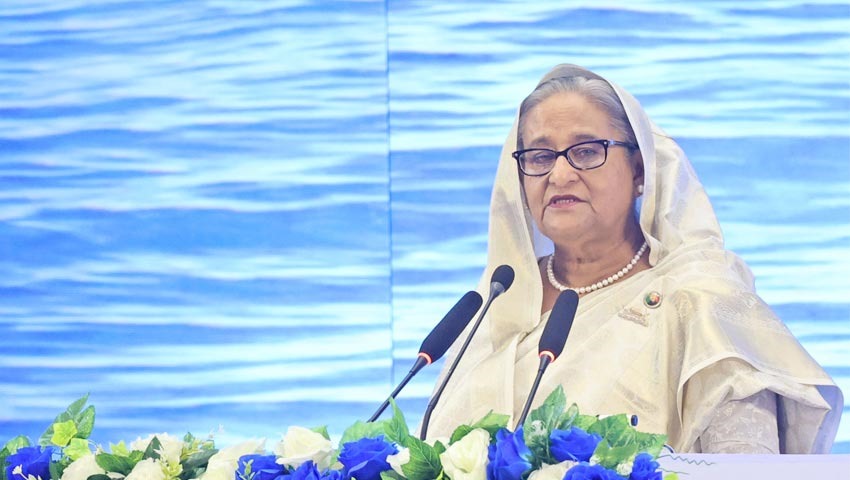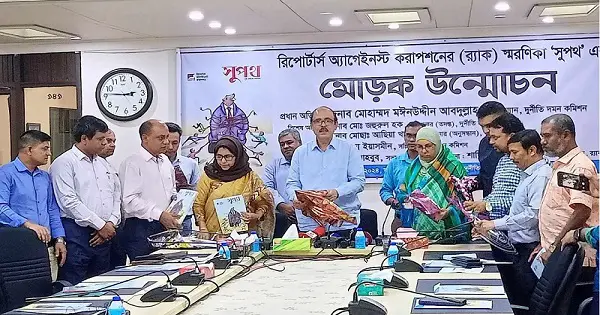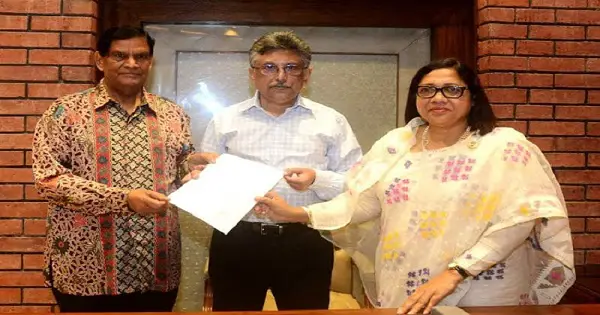Prime Minister Sheikh Hasina emphasized extracting’marine’resources’ from Bangladesh’s vast marine area while maintaining friendly relations with neighboring countries for the socio-economic progress of the country.
He said, ‘We have to extract marine resources from the marine areas we have acquired. I believe the announcement of the Blue Economy will be implemented. We have to use the huge marine resources for the socio-economic development of Bangladesh.
Sheikh Hasina was speaking as the chief guest at an event organized on the occasion of the golden jubilee of the enactment of ‘The Territorial Waters and Maritime Zones Act, 1974’ at the Bangabandhu International Conference Center (BICC) on Thursday morning (February 22).
He said we will be vigilant in extracting our marine resources and continue our trade and commerce by sea, following our foreign policy of ‘friendship with all, enmity with none’.
The Chief Minister said we settled the maritime boundary with Myanmar and India in 2012 and 2014. The ‘Territorial Waters and Maritime Zones Act, 1974’ has been serving as an important guide for us, and I think it will continue to do so in the future.
He said that the Awami League government conquered the sea through tireless efforts, and we were able to acquire a huge sea area.
Sheikh Hasina said that the vast economic area that we have found in the sea will contribute a lot to the economy of our country. Therefore, as a result of the foresight of Father of the Nation Bangabandhu Sheikh Mujibur Rahman and the dedicated efforts of the current Awami League government, Bangladesh is moving forward in the national development index. He said, I believe that the seminar that is being held on this day will play a helpful role in increasing cooperation and awareness among all the maritime organizations of the country on the principle of the ‘Territorial Waters and Maritime Zones Act 1974’ for the best use of marine resources and safe and effective management of the sea.”
The Prime Minister said that the Bay of Bengal is a part of the Indian Ocean. International trade has been running through this region since ancient times.
He said that all the countries connected with the Indian Ocean, Bangladesh, and our neighboring countries must always remember one thing: this region is very safe. There is no conflict with anyone, and the region has been a very important sea route for trade and commerce since ancient times. These sea lanes are used equally by all our countries, and international trade takes place. No conflict has arisen in this area.
He expressed optimism and said, We will always want that our business and trade around this region should never be in conflict or create any conflict here. As it continues to be a peaceful trade route, may it continue to continue in the days to come.
The Prime Minister said, I believe that the extraction of marine resources in our territory, which we have achieved, and in our economy, the ‘Blue Economy’ that we have declared, will be very effective. We have already created an institution for research. We have taken appropriate measures in this regard. So we will adhere to the principle of ‘friendship with all and enmity with none’. By adopting this foreign policy, we will be vigilant enough to ensure that our marine resources are extracted and our trade and commerce continue at all times while maintaining friendly relations with all.
The Prime Minister said that Bangladesh always believes in peace. He also said, “We don’t want war; we want peace.” Peace shows the way to development and progress and helps the country move forward.
Sheikh Hasina said, ‘We will never engage in war. But we have the ability to protect our sovereignty.
He said, We are celebrating the golden jubilee of the ‘Territorial Waters and Maritime Zones Act 1974’. So now is the time to realize the significance of this law.
The Prime Minister later visited various stalls of maritime stakeholders at the BICC.
The State Minister for Shipping, Khalid Mahmud Chowdhury, spoke on the occasion.
Secretary of the Ministry of Foreign Affairs (Maritime Affairs Unit) Rear Admiral (Retd.) Md. Khurshed Alam presented the keynote speech, and Navy Chief Admiral M. Nazmul Hasan gave the welcome speech.
An audio-visual documentary was screened on the occasion to mark the golden jubilee of the enactment of ‘The Territorial Waters and Maritime Zones Act, 1974’.
The Prime Minister said, Father of the Nation, Bangabandhu Sheikh Mujib, did not just give us a state. He established an independent, sovereign Bangladesh. Along with this, he enacted the Territorial Waters and Maritime Zones Act 1974 to ensure uninterrupted commercial communications and the importance of the maritime economy. Even then, the United Nations has not adopted any such law or policy. Eight years later, i.e., in 1982, the United Nations formulated Clause 3. But after the formulation of Clause 3, the post-75 governments in Bangladesh that came to power in violation of the constitution did not take any further initiative. It fell where the father of the nation had left off. We had no rights in the vast sea area of Bangladesh.
The Prime Minister said that the father of the nation also made the agreement to specify not only the borders in the sea but also the land borders that we have. He signed a treaty with India and also amended our constitution and implemented the treaty. But later, it was no longer implemented.
He said that after coming to power after 21 years in 1996, the Awami League government started working on them again but could not complete them due to a lack of time.
Sheikh Hasina had done these things very secretly and had signed the UN Annexure, he said. So that the rights that we have on the sea border should be confirmed.
He said that his government is following the foreign policy left by the father of the nation: ‘friendship with all and enmity with none’. Besides, his government took initiatives to establish our rights. But organizing and gathering information only takes time. And he could not come to power in the election of October 1, 2001. So all the initiatives of the Awami League stopped there. Because those who came to the government later did not take any initiative in this regard.
The Prime Minister said that his government was able to do it properly after coming to power for the second time in 2009.
He reiterated his promise to establish Bangabandhu’s dream of a golden Bangladesh by building a science- and technology-based ‘Smart Bangladesh’ by 2041. He also reiterated his call to foreigners to come forward and invest here by making use of the opportunities given by his government.





